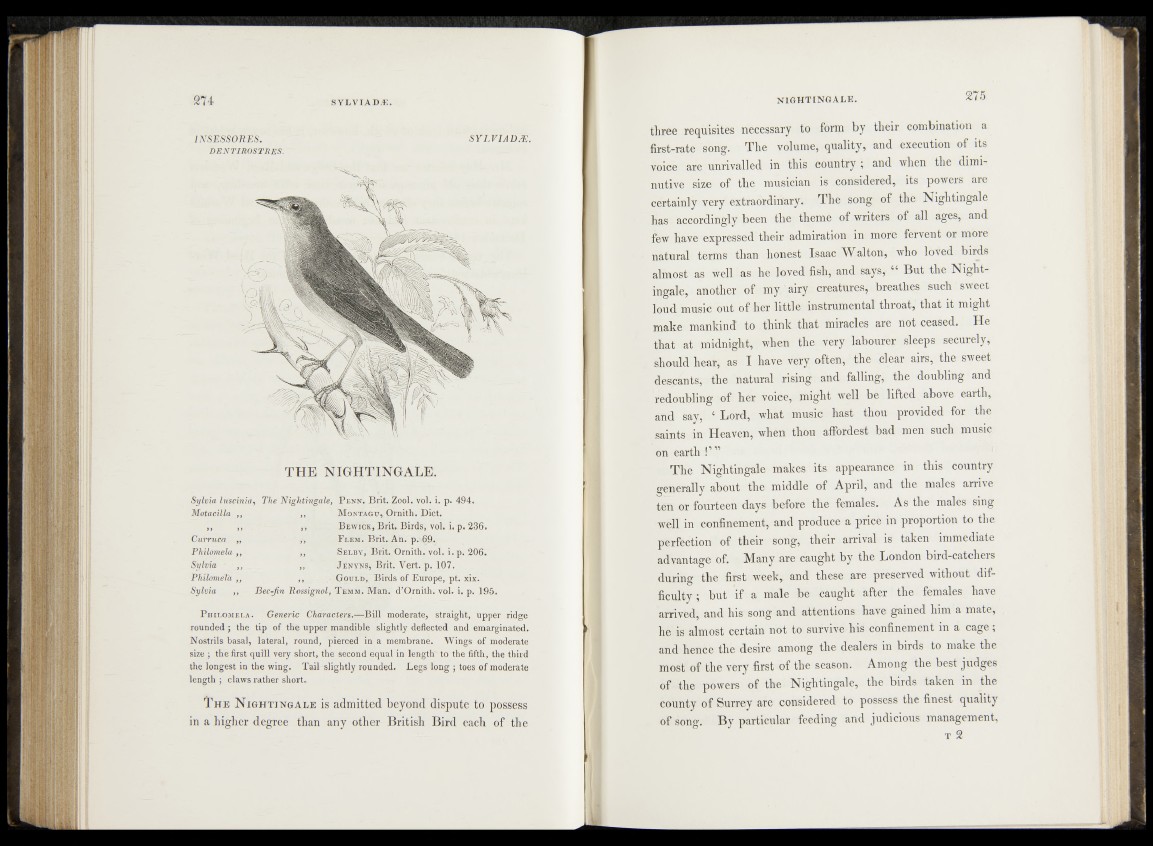
1NSESS0RES.
DEN TIROSTRES.
SYLVIADÆ.
TH E NIGHTINGALE.
Sylvia luscinia, The Nightingale,
Motacilla ,, ,,
Curruca „ ,,
Philomela,, ,,
Sylvia ,, „
Philomela ,, ,,
Sylvia
P enn. Brit. Zool. vol. i. p. 494.
M ontagu, Ornith. Diet.
B ewick, Brit. Birds, vol. i. p. 236.
F l em. Brit. An. p. 69.
Selby, Brit. Ornith. vol. i. p. 206.
J enyns, Brit. Vert. p. 107.
G ould, Birds of Europe, pt. xix.
Bee-Jin Rossignol, T emm. Man. d’Ornith. vol. i. p. 195,
P h ilom ela. Generic Characters.—Bill moderate, straight, upper ridge
rounded ; the tip of the upper mandible slightly deflected and emarginated.
Nostrils basal, lateral, round, pierced in a membrane. Wings of moderate
size ; the first quill very short, the second equal in length' to the fifth, the third
the longest in the wing. Tail slightly rounded. Legs long ; toes of moderate
length ; claws rather short.,
T h e N ig h t in g a l e is admitted beyond dispute to possess
in a higher degree than any other British Bird each of the
three requisites necessary to form by their combination a
first-rate song. The volume, quality, and execution of its
voice are unrivalled in this country ; and when the diminutive
size of the musician is considered, its powers are
certainly very extraordinary. The song of the Nightingale
has accordingly been the theme of writers of all ages, and
few have expressed their admiration in more fervent or more
natural terms than honest Isaac Walton, who loved birds
almost as well as he loved fish, and says, “ But the Nightingale,
another of my airy creatures, breathes such sweet
loud music out of her little instrumental throat, that it might
make mankind to think that miracles are not ceased. He
that at midnight, when the very labourer sleeps securely,
should hear, as I have very often, the clear airs, the sweet
descants, the natural rising and falling, the doubling and
redoubling of her voice, might well be lifted above earth,
and say, ‘ Lord, what music hast thou provided for the
saints in Heaven, when thou affordest bad men such music
on earth f ”
The Nightingale makes its appearance in this country
generally about the middle of April, and the males arrive
ten or fourteen days before the females. As the males sing
well in confinement, and produce a price in proportion to the
perfection of their song, their arrival is taken immediate
advantage of. Many are caught by the London bird-catchers
during the first week, and these are preserved without difficulty;
but if a male be caught after the females have
arrived, and his song and attentions have gained him a mate,
he is almost certain not to survive his confinement in a cage;
and hence the desire among the dealers in birds to make the
most of the very first of the season. Among the best judges
of the powers of the Nightingale, the birds taken in the
county of Surrey are considered to possess the finest quality
of song. By particular feeding and judicious management,
t 2